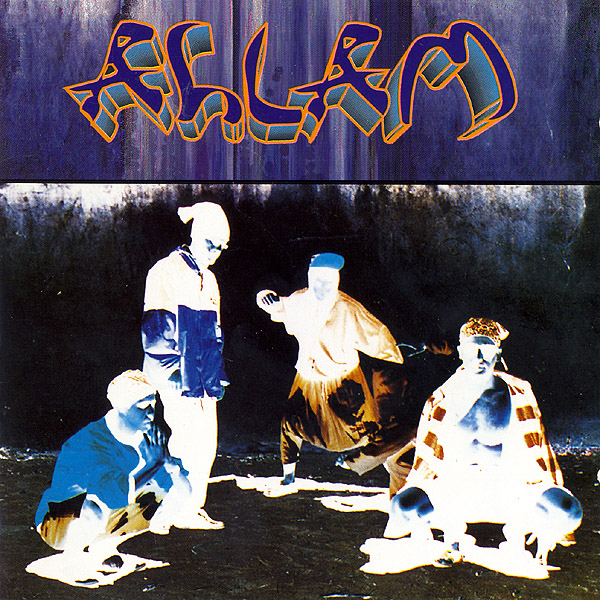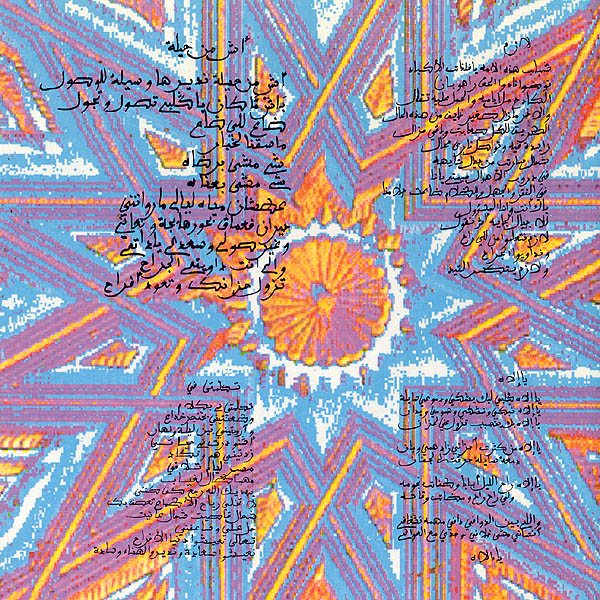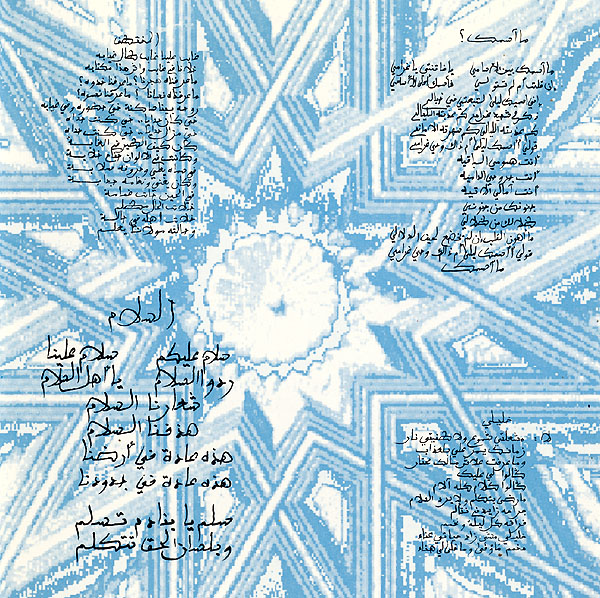AHLAM






1/ Tkelemti (Ahlam,Laswell) 6.16
2/ Shouma (Ahlam) 5.05
3/ Ash Men Hila (Ahlam,Laswell) 6.50
4/ Salam (the real peace) (Traditional,Ahlam) 5.39
5/ Terradi (Traditional,Ahlam) 3.10
6/ Irfiq Rak 2 (Ahlam,Laswell) 7.04
7/ Shabab (Ahlam) 6.02
8/ Yaillah (Ahlam) 3.39
9/ Mashi (Traditional,Ahlam,Laswell) 4.36
10/ Masmouki (Ahlam) 4.20
11/ Ghab (Ahlam) 4.28
12/ Shabab Dub (Ahlam) 6.03
Recorded at Ziryab with Kador and Jalal, Casablanca, 1994
Tracks 4,5 and 9 recorded at Bouaza with Toufiq, Casablanca, 1991
Additional recording and mixing on tracks 1,3,6 and 9 at Greenpoint Studio,
Brooklyn, New York, December 1994
Engineering, processing and programming on tracks 1,3,6 and 9 by Robert Musso
Assistant engineer on tracks 1,3,6, and 9: Layng Martine
Produced, arranged and mixed by Pat Jabbar
Tracks 1,3,6 and 9 produced and arranged by Bill Laswell and Pat Jabbar
Track 12 mixed by Fido K.
Administration for Material, Inc.: Tracy McKnight
Mastered by Bill Laswell at Greenpoint
Bill Laswell (1,3,6,9): bass, 6-string bass, shortwave radio; Cheb Fajer: voice; El Faris:
voice; Imam el Rika: voice; Jelmoudi: mandolin; Cheb Qchatar: electric guitar; Pat
Jabbar: synth, samples; Robert Musso (6): electric guitar; Likkle Jer (3): chatt; Fido K.
(7,12): MIDI bass; Nourdine (5,9): violin; Abdou (4,5,9): percussion; E.B. Mohamed
(2,3,8) : inspiration.
1995 - Barbarity (Switzerland), BARBARITY 009 (CD)
Cliff Furnald (courtesy of the Rootsworld website)
Bill Laswell co-produced this album with Pat Jabbar, and plays bass on a few of the tracks. Whether due to Laswell's influence or not, this has a smoother, more dancefloor-polished feel. As Europe and North America already have electronic dance music by the cartload, it would seem as though Ahlam would stand a better chance of attracting interest by maintaining their Middle Eastern-North African influences, not diluting them. It may be the direction the musicians want to pursue, but world music fans will likely much prefer Ahlam's debut album to this competent, but less imaginative, compound of casbah sounds with 1990s beats. It should be said that the lyrics (some of which are translated in the sleeve) are still pretty radical statements in the context of Moroccan society, advocating peace and struggle for justice, and declaring, "We're fed up with war and destructive ideologies." Most open-minded listeners will agree--but do they want to dance to it?
Richie Unterberger (courtesy of the All Music Guide, via the Getmusic.com website)
At least since Michael Rose, reggae vocalists have flirted with a plaintive, Middle Eastern delivery, so Moroccan band Ahlam's blend of Gnawa harmonies and dancehall rhythms would be anticlimactic if it weren't so good. Heretofore Ahlam's releases on the Swiss Barbarity label haven't penetrated over here, but Acting Salam benefits from co-production, mastering, snaking bass guitar and resulting visibility by Moroccan music enthusiast Bill Laswell, who always knows a phenomenon when he finds it. Gnawan elements reside mainly in the strong group singing punctuated by sufferer harmonies and lifted by the occasional eruption of a solo voice from the mournful fray. Instrumentation borders on standard synth-heavy reggae dance rhythms taking off from traditional-derived introductions, like the sintar-influenced licks that open "Ash Men Hila" (What's the Solution). "Salam," though, immerses itself deep in bazaar culture with a herky-jerky eastern beat, amplified mandoline, and heavy moments of a cappella inspiration. Another great touch on the Laswell-produced "Ash Man Hilla" is the unlikely entrance of rodent-voiced rapper Likkle Jer, who ferociously gnaws his way into the heart of the song.
Bob Tarte (courtesy of The Beat Magazine, via the Technobeat.com website)